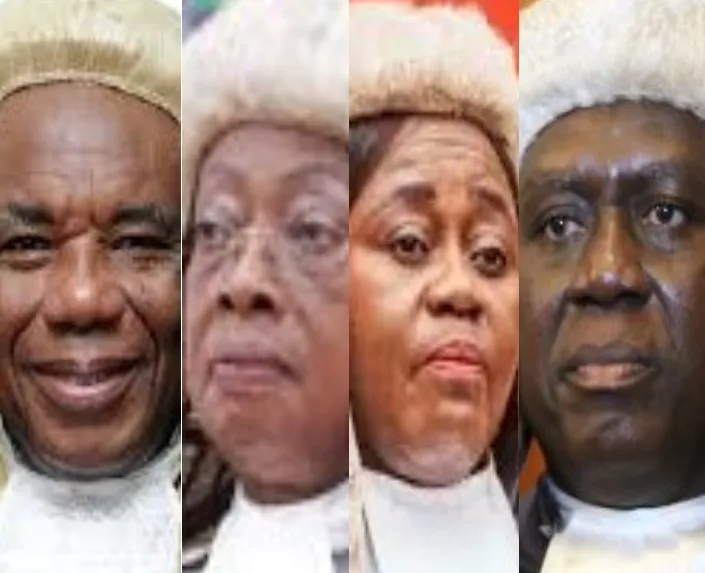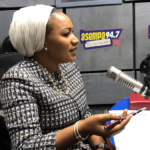Two former Chief Justices of the Republic, Justice Sophia Akuffo (rtd) and Justice Kwasi Anin Yeboah (rtd), together with other legal luminaries and jurists, have appeared before the five-member Article 146 committee established by President John Dramani Mahama to testify in support of the sitting Chief Justice, Justice Gertrude Esaaba Sackey Torkornoo, sources close to the committee have confirmed.
Among other jurists and reputable legal minds who have also appeared before the committee, according to a source familiar with developments around the case, are Nana Dr S K B Asante – the senior Ghanaian statesman, lawyer and paramount chief of Asokore Asante in the Ashanti Region who was the chairman of the committee of experts that drafted the 1992 constitution – and Justice Jones Dotse, the retired justice of the Supreme Court.
The list of witnesses also includes Samuel Okudzeto, a former member of the Council of State and renowned legal luminary of over 65 years’ standing at the Bar in Ghana.
Countered allegations
Another source familiar with the work of the committee also said that the executive committee of the Ghana Bar Association (GBA), represented by its president, Efua Ghartey, the GBA vice-president, Victoria Nana Ama Barth, and its executive secretary, Kwaku Gyau Baffour, also stormed the committee to present the facts of the matter and counter the allegations that the Justice Gabriel Scott Pwamang-led committee is supposed to investigate.
They presented records on work done by the Ghana Bar Association for the expansion of the Supreme Court.
Chief Justice Torkornoo has been accused of unilaterally recommending five judges for appointment to the Supreme Court after comprehensive research was done by the judiciary, Attorney General and Ghana Bar Association.
Since his assumption of office less than eight months ago, President Mahama has appointed seven judges to the Supreme Court.
Voluntary appearance
All the legal luminaries and jurists mentioned appeared voluntarily and without subpoenas before the Article 146 committee at the request of Chief Justice Torkornoo, with the intention of presenting the truth to the committee. They are believed to have appeared and testified before the committee between 4 August and 18 August 2025.
The Chief Justice of the Republic was suspended by President John Dramani Mahama on 22 April 2025, after consultation with the Council of State on three petitions submitted to the president demanding her removal from office.
She has duly been attending the committee’s sittings, which commenced on 15 May 2025, 23 days after Chief Justice Torkornoo was removed from office temporarily, pending further investigation.
Corroboration
Nana Dr S K B Asante is said to have testified that Article 146 was not included in the constitution to justify removing a chief justice for any reason such as going on vacation with a spouse.
Like in all other Commonwealth nations, the only grounds for the removal of a chief justice allowed under Article 146 (1) of the 1992 constitution are reasons which prove that the chief justice is unable to perform the functions of the office, he said.
During their testimonies, the former chief justices and other leading legal figures and jurists corroborated the position of the Chief Justice in her response to the petitions submitted to the president by the three petitioners. The petitions were forwarded to the Chief Justice by the Office of the President to seek her side of the story after she demanded copies.
“The lawyers of the Chief Justice solicited from the two former chief justices who appeared before the committee, for example, [information] about the travel benefits that came with their office when they occupied the position of Chief Justice,” the source familiar with the committee’s sitting said.
“The former chief justices both pointed out before the committee that they enjoyed the same benefits that the current Chief Justice has been accused of by one of the petitioners.
“On the issue of assigning cases to judges and specific courts, the two former chief justices indicated before the committee that these matters were part of the usual administrative responsibilities of every individual occupying that office,” the source added.
Staggered process
The procedure adopted by the Article 146 committee in conducting its affairs, which the Chief Justice has raised concerns with, also came up for scrutiny when the other jurists, such as Justice Jones Dotse (rtd), Nana S K B Asante and Sam Okudzeto, appeared to testify, the source said.
The senior jurists, the source said, explained the seriousness that must characterise a charge for which an Article 146 committee must be set up to address, and juxtaposed that context against the nature of the complaints brought against Chief Justice Torkornoo, which were all about matters that a chief justice was supposed to do as part of his or her work.
It was also contended that the committee’s failure to serve the Chief Justice and her legal team with the prima facie findings of the president, reached in consultation with the Council of State, constituted a straightforward breach of the 1992 constitution and made the hearings invalid.
So did the failure to specify the specific issues set down for consideration by the committee.
CJ’s testimony
Chief Justice Gertrude Araba Esaaba Sackey Torkornoo has been testifying before the committee since Monday 18 August 2025, said another source familiar with the work of the Article 146 committee, adding to the evidence that all the accusations made against her are false.
The source added that after the testimony by the Chief Justice, the committee is expected to conclude its work and begin preparing its report, which will be submitted to President Mahama.
Background
The Chief Justice of the Republic, Gertrude Araba Esaaba Sackey Torkornoo, was suspended from office by the President of the Republic, John Dramani Mahama, on 22 April 2025.
The president’s actions, which are said to be grounded in Article 146 (10) of the 1992 constitution, were supposed to be in response to three petitions that the president received seeking the removal of the Chief Justice from office.
A group calling itself the Shining Stars of Ghana submitted the first petition to the president on 14 February 2025. Kingsley Agyei, who describes himself as the chairman and convenor of the Shining Stars of Ghana, signed the petition. A search at the Registrar of Companies shows that no such group has been registered in the country.
Assistant Commissioner of Police (ACP) Ayamga Yakubu Akolgo (Esq), a senior police officer in the Ghana Police Service stationed at the National Police Headquarters in Accra, was the second petitioner to submit a petition to the president for the removal from office of the Chief Justice.
Akolgo’s submission was also made on 14 February 2025 and complained about matters that happened in the course of the Supreme Court’s work. Justice Gabriel Pwamang was a member of the Supreme Court panel at the centre of Akolgo’s complaint, and yet he is sitting as chairman to judge the Chief Justice on the same case.
The third and final petition, presented to the president by Daniel Ofori, is dated 17 March 2025. The petitioner makes claims involving 21 allegations of misbehaviour and four allegations of incompetence, all of which relate to the Chief Justice’s discharge of her administrative roles and functions as head of the judiciary.
Committee members
Justice Gabriel Scott Pwamang, who is currently the second most senior Supreme Court judge in Ghana (if you include the suspended Chief Justice in the count) – or the most senior justice of the Supreme Court after the acting Chief Justice, Justice Paul Baffoe-Bonnie (if one excludes the suspended Chief Justice) – is the chair of the five-member committee.
The committee’s other members are Justice Samuel Kwame Adibu-Asiedu, a justice of the Supreme Court; Daniel Yaw Domelevo, a former auditor general; Major Flora Bazwaanura Dalugo, an officer of the Ghana Armed Forces; and Professor James Sefah Dzisah, an associate professor at the University of Ghana.




